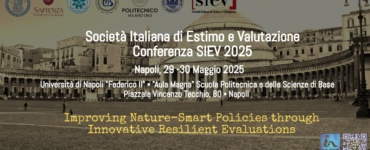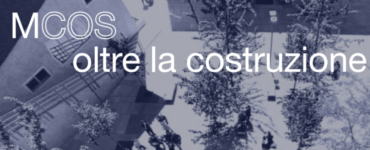Multidisciplinary Considerations in Landscape, Infrastructure, Architecture, and Resource Management
Mediterranea University of Reggio Calabria 11-13 December, 2024 Italy
Dear colleagues,
We are pleased to announce that the first edition of the International Conference “Landscapes Across the Mediterranean (CrossMED)” will be held at Mediterranea University of Reggio Calabria (ITALY) from 11 to 13 December 2024.
The conference is organised in partnership with a selected network of Italian and foreign universities, international research organisations and scientific societies.
The main objective of the conference is to promote innovative research and provide a multidisciplinary platform on the topic of landscape, with a focus on the Mediterranean region, bringing together scholars, experts and academics.
The conference aims to highlight the role of the Mediterranean region in the global transition by means of the landscape “multiple unity” here assumed as the starting point and the ultimate end of the responsible territorial resources management in an increasingly interconnected world. The conference themes cover issues of global relevance. Climate change, sustainable resource management, cultural heritage conservation and the promotion of equitable economic development are just some of the issues that will be addressed.
https://www.ierek.com/events/landscapes-across-the-mediterranean-crossmed#conferencetopics
For more details on the conference see
https://www.ierek.com/events/landscapes-across-the-mediterranean-crossmed#introduction
In particular, among the various clusters that will explore the central theme of landscape from different scientific perspectives, we will curate:
Topic 10: “Mediterranean value-scapes. Contents and shapes of the land axiological reform”,
which will deal with the multiple evaluation and decision-making issues involved in the different fields of the global transition panorama.
Both short papers (4-6 pages) and long papers (8-12 pages) can be submitted. Manuscript are peer-reviewed through a rigorous double-blind process and, if accepted, will be published in the Advances in Science, Technology & Innovation (ASTI) indexed in SCOPUS.
Important Dates:
Registration: open
Abstract Submission Deadline: 15 July 2024
Short/Long Paper Submission Deadline: 15 September 2024
It will be possible to register and submit papers on the following platform after registration: https://www.ierek.com/events/landscapes-across-the-mediterranean-crossmed#registrationfees
Call for Topic
- Mediterranean value-scapes. Contents and shapes of the land axiological reform
https://www.ierek.com/events/landscapes-across-the-mediterranean-crossmed#conferencetopics
Lucia Della Spina, Salvatore Giuffrida, Maria Rosa Trovato
The Topic focuses on the evaluative and decision-making aspects of the prospects for the progressive reform of Mediterranean landscapes.
The complexity of these geographies and the unity of their value perspective outline the scientific and operational context that selects contents and pathways of evaluation supporting active protection processes and the rebalancing of the territory to be assumed as an eco-socio-systemic unit integrating sustainability and inclusion.
This session welcomes contributions on decision-making processes – robust both in content, salient values, and in form, methods, and models – that valorize aspects of landscape uniqueness capable of shaping and prospecting the parts of the territory predominantly characterized by diffuse, often unrecognized, values.
The underestimation of the tensions caused by this dialectic has led to different forms of wealth transfer to urban and coastal territorial attractors with increasingly negative balances and from the viewpoints of the multiple forms of landscape.
The unity and recognizability of the different landscape units is affected by tensions between: the rapid development of real estate and the long run of landscape evolution; the inertia of material culture and the spread of ‘vibrant’ lifestyles; the rhythms of seasonal tourism and fragile local economies; the modernization of settlement systems and infrastructures, and the indissolubility of the formal unity of urban aggregates and agricultural territories, etc. The representation by values of such dualities supports the reasons for sharing, consensus, convergence.
The following subtopics aim to promote the sharing of experiences on the best practices in the field of the complex challenges that the multiple issues that Mediterranean landscapes, in their natural, eco-systemic, environmental, human, social, cultural, economic dimensions, pose to land policies in order to make them able to encourage forms and models of sustainable management based on multiple and converging axiological interpretations of the empirical evidences.
- Natural-scape and space-time consumption
- Urban-scape and suburbanization
- Real Estate-scape and housing deprivation
- Tourism-scape and social-environmental impacts
- Cultural-scape and local identities dissolution
- Coastal-scape and public functions abdication
- Energy-scape and land entropy
Natural-scape and space-time consumption (coordinators : Marta Bottero – Giulio Mondini)
Mediterranean ecosystems are characterized by their primary relation to a specific system of values mainly connected to the balance between nature and culture: “in space”, therefore, in the harmony between small town centres once densely populated, and wide, discontinuous, dispersed landscapes; in time, with the distinct seasonal rhythms of family and social events. Measures that on a European scale support broad processes of land renaturation can affect new directions of production, consumption and lifestyles while correcting the extensive forms of physical and functional contamination in order to recover the relationship between human being and nature, in places as much as in the times of living, working, and recreating.
Urban-scape and suburbanization (coordinators : Benedetto Manganelli – Ezio Micelli)
The Mediterranean urban landscape has been strongly marked by a process of rapid and haphazard building during the economic boom period that forced the natural rhythm of urban growth resulting in an imbalance between the richness of personal and collective needs and specialization of functions. The result has been processes of functional and symbolic recombination between centers and suburbs that have redrawn the map of socio-professional aggregations and locational value, accessibility, urban density, housing values, vocations and potentials.
Real estate-scape and housing deprivation (coordinators : Laura Gabrielli -FrancescoTajani)
The real estate landscape is regarded here as the ethical and aesthetic dimension of the human city, that is, of the resources and opportunities that consolidate the sense of community in the care of property. The territorial disadvantage mainly characterizing the south of Italy due to the poor accessibility of valuable services increasingly concentrated in metropolitan aggregations, is reflected as much in the lack of services as in the housing deprivation that characterizes an ever more obsolete building stock from a structural and technological point of view, and conversely an ever less affordable real estate stock. Structural real estate crises, the abandonment of inland and suburban areas and the inefficiency of fiscal equalization by the land registry administration reflect on the physical, functional and architectural state, and on the relational density of urban space.
Tourism-scape and social-environmental impacts (coordinators : Maria Cerreta – Grazia Napoli)
The development of tourism sector and its divers – capillary transportation networks, low-cost fares, housing more and more flexible – has increased the seasonal pressure over the more valuable and fragile landscape areas. Such a space-time concentration of personal service economies resulted in an asymmetry between endogenous resources and exogenous demand. This imbalance, on the one hand, has supported the demand for temporary jobs, and has generated an overload of environmental emissions; on the other, it has modified the price structure both in the goods market and in the real estate market, giving rise to phenomena of filtering-up and inequity in the distribution of territorial wealth to the detriment of the inland areas.
Cultural-scape and local identities dissolution (coordinators : Fabiana Forte – Alessandra Oppio)
The Mediterranean cultural landscape evolved due to the interaction between the favorable climate condition and the convergence, interaction and contamination of civilizations and cultures. Flourishing communities and economies hoarded huge parts of the social product surplus in the forms of the cultural asset, thus forming places suitable to produce ideas and shapes. The Mediterranean territories are the densest ones of these widespread testimonies but the progressive concentration of wealth in the metropolitan and coastal areas has led to the abandonment and dissolution of large parts territories characterized by widespread cultural asset with low value density but of great territorial significance and therefore landscape importance.
Coastal-scape and public functions abdication (coordinators : Ivan Blecic – Maria Rosa Trovato)
Coastal landscape is one of the original dimensions of Mediterranean sea, vibrant cradle of civilizations, and favourable context for the development of the liberal thought. Waterfront, as the frontier between land and sea has ever been the main driver of exchange and progress of ideas and values consolidated in the collective imaginary as the icon of the of sharing and mutual acceptation. Such a value density and potential has been supporting the development of economies in many sectors – production, services, real estate – and the related demand for location and specialised uses of the waterfront has progressively reduced its public function, thus increasingly excluding large parts of the population from recreational use.
Energy-scape and land entropy (coordinators : Cristina Coscia – Chiara D’Alpaos)
One of the fundamental principles of ecological economics is the inescapable constraint of energy dissipation. In its general validity, this principle applies to every system, from the thermal ones, aimed at the production of mechanical power, to the social ones, aimed at the production of surplus in terms of welfare. In the prospect of the ecological transition, the use of renewable energy sources implies the installation of territorial-scale plants to capture, concentrate and accumulate the diffuse energy present in natural components (wind, light, hydraulic bodies). Measuring the dissipation of the landscape potential of territories is now one of the most important issues in the development of the territorial energy plans.
















Aggiungi commento